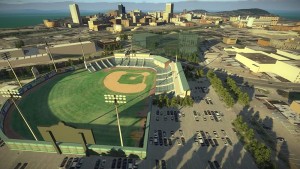Sorry, but no city needs to blow $100 million in a bid to pump up civic pride. Especially Worcester, which struggles each day to pay for basic services like schools and police.
Yet civic pride, or if you are not so charitably inclined, unthinking civic boosterism, is essentially what Worcester’s decision to lure the PawSox to town with the promise of a new stadium is all about.
Worcester will borrow $100 million over the next three decades to pay for the new 10,000-seat stadium, to be built on a vacant industrial site in the city’s Canal District. Bailing on their long-time hometown of Pawtucket, the Triple A Red Sox affiliate will chip in $34 million and cover any cost overruns.
City officials and some business leaders are casting the new stadium as the catalyst for a larger redevelopment of the Canal District neighborhood and a tract of idle, post-industrial brownfields that will include new apartments, retail space, two hotels and redesigned roadways.
“This is a significant milestone, in that the proposal will not only involve the construction of a new ballpark but a major redevelopment of the long-vacant Wyman-Gordon site into a mixed-use district,” the Worcester Regional Chamber of Commerce crowed in a statement.
The idea that building a small stadium for a minor league team will unleash a mini-economic boom is just so much boosterish happy talk. For starters, this is far from a case of a ballpark being proposed and developers flocking to ride its coattails.
Rather, it’s no secret developer Denis Dowdle was already well along with exploring plans to redevelop the 18-acre former Wyman-Gordon industrial site last spring, according to the Worcester Telegram & Gazette. That was months before the PawSox indicated they would be exploring a move to another city, let alone planning a move to Worcester.
By the time Worcester officials had begun talks with the PawSox, Dowdle already had a deal for the site and was crafting plans for its redevelopment. In fact, Dowdle told the paper he would have still moved forward with his development plans without the ballpark and said he would have eventually built a hotel and housing on the site.
That’s a pretty key detail – and one that makes a mockery of claims by Worcester officials claims the ballpark as some sort of major economic development driver for the area.

Scott Van Voorhis
Heed the Economists
While a minor league stadium may be more fun for fans, it’s a loser as far as Worcester’s finances go. The city will build and own the new stadium, meaning it will pay no taxes. By contrast, a hotel and housing built on the same site would surely contribute millions in new taxes over the coming decades.
And while it might have taken a little longer for Dowdle to have built out the site on his own, the wait would surely have been worth it given the ultimate payoff – millions in new tax revenue compared to none, with the city taking on a large amount of new debt as well.
Of course, there are already plans in place for 250 apartments, a hotel and retail space on the land around the ballpark, so there will be development, even with the 6-acre stadium site taken off the table.
But guess where the tax money generated by this new development will be going? You guessed it, to help the city pay off the new ballpark it is building, not to cops and schools.
It’s not exactly like Worcester can spare the cash – either the $100 million in debt it will be taking to build the ballpark or the millions it is giving up in potential commercial and residential tax revenue from future development on the site itself.
The city’s schools are perpetually underfunded and struggle year in and year out to close budget deficits.
But then again stadium projects almost never bring with them major economic development spinoffs. That’s not just me spouting off, but rather the verdict of several economists who have looked at the issue over the years, including a pair of prominent hometown economists, Robert Baumann and Victor Matheson, at one of Worcester’s most prominent academic institutions, Holy Cross. The pair have been quite outspoken in their belief that the stadium is a bad deal for the city.
“When economists who are not being paid by a team go back and look at stadium deals, we typically find that they are pretty poor municipal investments,” Matheson told Commonwealth magazine. “They tend to be pretty expensive for not much return in the way of jobs or returns.”
The two Holy Cross economists aren’t making any friends at Worcester City Hall with such views.
And that makes their decision to speak out all that more gutsy and compelling – and worth heeding.
Scott Van Voorhis is Banker & Tradesman’s columnist; opinions expressed are his own. He may be reached at sbvanvoorhis@hotmail.com.




 |
| 

